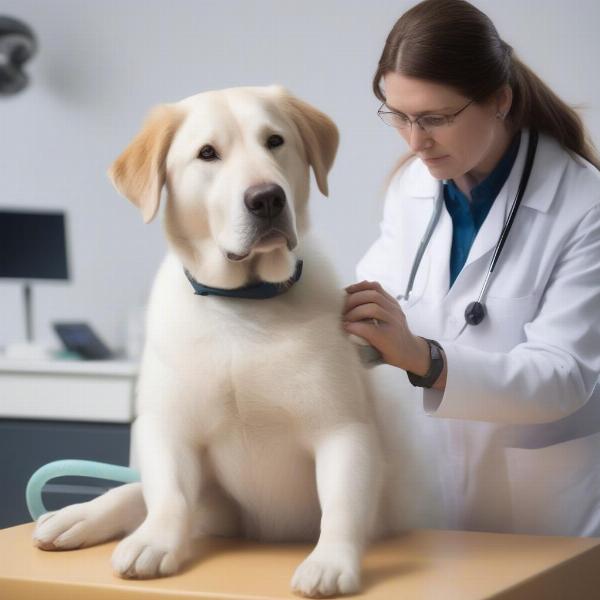Dogs eating goose poop, while unpleasant for us, is a surprisingly common behavior. Many dog owners have witnessed their furry friends indulging in this unsavory snack, leaving them bewildered and disgusted. Understanding why dogs engage in this behavior can help owners manage it and potentially address any underlying issues. This article will delve into the reasons behind this peculiar canine habit, exploring everything from dietary deficiencies to instinctive behaviors.
The Science Behind the Snack: Why Goose Poop is Appealing to Dogs
While it seems repulsive to us, goose droppings can be attractive to dogs for several reasons. Goose poop contains undigested plant matter, which can retain appealing smells and even small amounts of nutrients. Dogs have a much stronger sense of smell than humans, so what we perceive as foul, they might find intriguing. Furthermore, dogs are scavengers by nature. Their ancestors survived by consuming whatever was available, and this instinct can still influence their dietary choices today.
Nutritional Deficiencies: Could Your Dog Be Missing Something?
In some cases, a dog’s attraction to goose poop might indicate a nutritional deficiency. If a dog’s diet lacks essential vitamins or minerals, they might seek them out in unusual places. While goose droppings are unlikely to provide substantial nutrition, the behavior could be a sign that your dog’s current food isn’t meeting their needs. Consult with your veterinarian to rule out any dietary imbalances and ensure your dog is receiving a complete and balanced diet.
Coprophagia: When Poop Eating Becomes a Problem
Eating feces, known as coprophagia, can be a more complex issue. While occasionally snacking on goose poop might not be cause for alarm, frequent or obsessive coprophagia can be a sign of underlying medical or behavioral problems. Conditions like pancreatitis, intestinal parasites, or even stress and anxiety can contribute to this behavior.
 Veterinarian examining a dog
Veterinarian examining a dog
Behavioral Factors: Curiosity, Boredom, and Attention-Seeking
Sometimes, the reason is simply behavioral. Dogs, especially puppies, are naturally curious and explore the world through their mouths. They might sample goose poop out of pure curiosity or boredom. In other cases, dogs might engage in this behavior to get a reaction from their owners, even if it’s negative attention.
Preventing Goose Poop Consumption: Tips and Tricks
Managing this behavior can be challenging, but there are steps you can take. Firstly, ensure your dog is on a high-quality, balanced diet to minimize the likelihood of nutritional deficiencies. Secondly, keep your dog mentally and physically stimulated with plenty of exercise, playtime, and interactive toys. Lastly, train your dog to leave it” or “drop it” using positive reinforcement methods. This can help redirect their attention away from the goose droppings.
Conclusion: Understanding Your Dog’s Dietary Quirks
While dogs eating goose poop might be a disgusting habit for us, it’s important to understand the potential reasons behind it. By addressing any underlying issues and implementing preventative measures, you can help curb this behavior and ensure your dog’s health and well-being. Remember to consult with your veterinarian if you have any concerns about your dog’s diet or behavior.
FAQ:
- Is goose poop toxic to dogs? While not typically toxic, it can contain parasites or bacteria that can cause illness.
- Why does my dog only eat goose poop and not other types of poop? The texture and smell of goose poop might be more appealing to some dogs.
- How can I stop my dog from eating goose poop on walks? Train a strong “leave it” command and keep them on a leash in areas with a lot of geese.
- Could my dog’s coprophagia be a sign of a serious medical condition? It could be, so consult your veterinarian to rule out any underlying health issues.
- What kind of diet should I feed my dog to prevent nutritional deficiencies? A high-quality, complete and balanced diet formulated for your dog’s age and breed.
- Is it normal for puppies to eat poop? It can be a phase, but it’s important to discourage the behavior early on.
- Can training help with coprophagia? Yes, consistent training with positive reinforcement can be effective.
ILM Dog is your trusted source for all things dog-related. We offer expert advice on dog breeds, health, training, nutrition, grooming, and more. From choosing the right breed to understanding your dog’s behavior, we’re here to help you navigate every aspect of dog ownership. For personalized advice and support, contact us today! Email: [email protected], Phone: +44 20-3965-8624. Visit ILM Dog for more helpful resources and expert guidance on dog care.